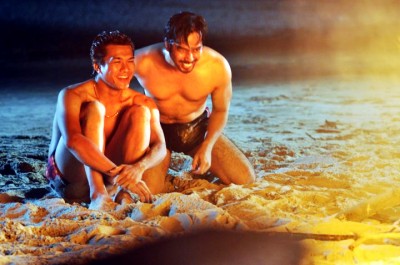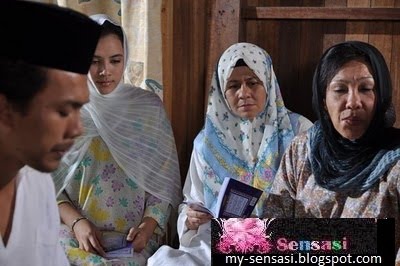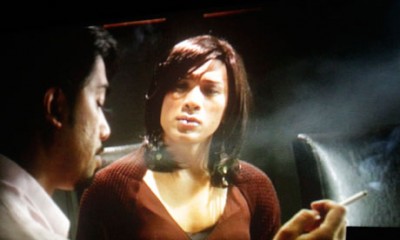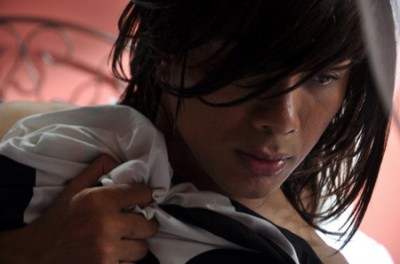Malaysia’s first ‘gay’ film “… Dalam Botol” is well-acted, brave, original and also misleading — according to four reviewers.
Seksualiti Merdeka organised a movie outing to watch … Dalam Botol. Eighteen of us turned up. Four of us reviewed it. Surprisingly, we don’t all hate it. Well, not really anyway.

Up there
by Kal Idris
I actually like this movie; it is not a typical Malaysian movie: horror, romantic or comedy. This movie carries universal themes.
I am absolutely shocked at the public’s take on this movie. They claim that it is unrealistic that a gay man could have undergone a sex-change operation without thinking deeply about it first. How could he be so blindly loyal to his lover? they ask. Well, there are such cases out there.
I admit that the storytelling could a bit better. I also don’t really understand why Ruby didn’t have breasts or skin enhancement when she had her surgery. And why didn’t she develop complications when she was pushed and shoved by her lover Gaus? I mean, the operation was just two months earlier.
Nevertheless, all these are very small matters that bear little weight compared to the solid acting of this movie. I loved both moms’ performances, as played by Normah Damanhuri and Fauziah Ahmad Daud, especially the scenes of them going berserk — they were so believable. I also love Ruby (Arja Lee) and Gaus (Wan Raja) — I enjoyed their performances in spite of their lack of physical beauty (except Dina). And as a debut director, Khir Rahman delivered strong and promising performances from his actors.
This isn’t quite as great as Brokeback Mountain, but it’s up there.

Sex and the Kampong
By Rachel Phang
The film is bravely controversial, being “politically correct” to no group. It is also cinematographically beautiful, being well shot and making good use of colour and the interplay of light and camera angles. I enjoyed the juxtaposition of KL and the kampong, giving this city girl a rare glimpse of kampong life. However, I also found it relatively slow moving, perhaps in a nod to the art-house genre. Its beauty was balanced by its lack in plot depth or substance, or character development. Overall, however, this is a sophisticated and impressive achievement from Malaysian cinema!

A bad case of schizophrenia
By Ezhan Mohd Yusof
… Dalam Botol could have won half a heart with the impassioned relationship involving Ruby/Bidin and his boyfriend, overwhelming the audience with a warm tone — a tone which was soon betrayed as that relationship painfully deteriorates. Such an emotional rollercoaster is not something only gay viewers could relate to, but everyone who has ever experienced love. Coupled with effective cinematography and an interesting premise, the film may just prove its critics wrong. It is at least arguably different from the rest of the Malaysian filmography. Despite everything unfavourable that has been said about the production, it serves as a proper justification for the LGBT community… so far.
Unfortunately however … Dalam Botol also suffers from a bad case of schizophrenia, not unlike its protagonist Ruby/Bidin. In what appears to be the most successful suicide attempt by a dramatist, any due merit achieved in the first 45 minutes is subsequently utterly destroyed.
Somewhere in the middle of the story, the protagonist settles down with a female love-interest and lost any sense of his previous femininity. In an almost unbelievable yet wonderful feat of determination, he transforms from pondan to abang-abang. The film gradually transgresses into being so deliberate and blase, the plot sluggish to the point of boredom. By conforming to the moral-majority, the film lost its purpose and integrity. Declared as based on a true story, the film implies that the LGBT community has deviated from the norm, as Ruby’s transformation suggests that her earlier non-heterosexuality may after all be superficial and not biological. This is tremendously misleading.

No Regrets
By Pang Khee Teik
In Anu Dalam Botol, a male character makes a hasty, impulsive decision to remove his penis — as if he was simply going for a haircut — only to regret it later. I could have told him as much. It is never worth it to cut yourself up for another man — if you gonna do it, do it for yourself.
As far as film premises go, this is pretty original. The acting, directing and production value of the movie are certainly above average by Malaysian standards. I just found the dialogue pretty banal and boring. And the character’s motivation a little confusing.
Is the protagonist gay or transsexual? I can’t tell, and it seems, neither could he/she. Sexual orientation and gender identity are different things (this article and this article explain it excellently) and if anything this film reflects accurately Malaysians’ general ignorance about this. A quickie lesson for those who had lousy science teachers: Sex refers to the biology, the differences based on chromosomes, homornes, both external and internal organs (the brain is your largest sex organ, but too bad you can’t compare sizes with someone else). Sex doesn’t automatically translate into gender identity. Gender is the cultural definitions and values of masculinity and femininity, gender roles is what society expects (boys for carpentry, girls for sewing), and gender identity is what we feel we are, usually a rojak of ingredients from culture and biology (macho male, gentle female, lelaki lembut, wanita keras, proudly undefined, modestly whatever). Finally, sexual orientation is who we are attracted to sexually, romantically and even secretly. So, not all men automatically like women — get used to it. And if a man falls in love with a man, it doesn’t mean he wants to be a woman — get used to it. And if she does want to be a woman, it doesn’t automatically mean she likes men — get used to it. Yes, it is EXPECTED for men to like women and women to like men, but what society expects is only as good as its teachers and its movies.
So thanks to producer-writer of the film Raja Azmi, the censorship board had to relax the guidelines early last year to allow depiction of homosexuals and transsexuals — even if they are required to repent by the movie end. Yes, it seems a step forward, but some may argue it takes the arts back to the days of Aesop’s fables. Interestingly, the regret expressed by the main character at the end of the film does not really amount to a repentance. The character never really repented, he just got even more emo than he already was. The slippage between regret and repentance makes this film quite subversive. Really.
Anu Dalam Botol is not representative of gay or transgender experiences in Malaysia and it does not need to be. A film represents itself. I completely support the right of filmmakers to represent their own stories just as I support the right of characters to make stupid choices.
I only wish the writer-producer Raja Azmi doesn’t go around saying this movie was meant to discourage people from going for “sex change operation”. The fact that she goes around saying “sex change operation” shows she is just as ignorant as her protagonist regarding this. The medical world no longer refers to it as “sex change operation” but “sex reassignment surgery“. To a transsexual who feels she is a woman, she is not changing her sex, she has always been a woman; she is merely correcting the biological defect protruding from her groin to match who she is inside. Some of us are lucky our brain sex matches our external organs, some of us aren’t so lucky. That’s all.
If anything, this film shows why so much more education and empowerment is needed so that people who are going through such issues don’t make hasty choices. Many hospitals now insist on certification from psychologists to state that a person seeking sex reassignment surgery has been provided the proper counselling and assessment, that it has been determined he or she is really a transsexual and is ready for such a surgical procedure. But due to the fatwa against it in Malaysia, some Malaysians seeking surgeries are insufficiently informed about the options available. Some put themselves at risk taking the unmonitored and unauthorised routes, so desperate are they to resolve their identity. If you have ever felt you are being perceived as someone you are not, you too will understand the desperation.
With proper counselling, it is possible that the protagonist may understand he is just a gay man — a gay man is a man, no need to reassign his sex. Or if she does identify as a woman, perhaps she could understand the consequences so she doesn’t regret it later.
So in the end, this is what I feel: We should demand for a bigger space in which to understand ourselves and each other better. We should allow more movies to represent the diverse world of LGBT experiences in Malaysia. The absurd and unrealistic guideline requiring LGBT characters to repent therefore needs to be killed. Let us tell our stories. Many of us Malaysian LGBTs have absolutely no regrets being who we are.
Seksualiti Merdeka is an annual sexuality rights festival organised by a loose coalition consisting of prominent NGOs and many individuals. The coalition was responsible for the series of videos “It Gets Better in Malaysia” which included Azwan Ismail’s “Saya Gay, Saya Okay”. It also organises regular monthly film screening called Queer As Films. Email [email protected] for schedule of the next screening. Pang Khee Teik’s previous article is The Gagging of Lady Gaga.

I love this. Your article very gratefull. Thanks
It seemed like she made the whole entire situation all about herself, and no mother can ever be THAT selfish in real life, imo. But then again, this ain't real life. *shrug* – See more at: https://www.loyarburok.com/2011/03/31/mana-anu/#st…
Better to make a movie "Botol di Dalam Anu"
free screening at Annexe then?
It is disappointing that so many LGBTs are dismissing the film without watching it first. If we don’t want people to dismiss us without giving us a chance to hear us, we must not do the same to others.
I understand that the producer does not help by going around saying things like the film is meant to educate people not to be influenced by gay culture, or to educate people not to go for sex change. Perhaps what she meant is that the lesson is to educate gays NOT to go for sex change, because gays are not the ones who need sex change. Anyhow, I am not defending her. Her public statements are not consistent and she seems to keep changing her stance.
In this later interview with The Sun, she said:
"I’m just telling a story. Some people go for sex change surgery without considering the pros and cons. They do it because their friends are doing it. My movie is targeted at those who are contemplating having a sex change. I am highlighting the other side of the coin.
"I have a few friends who are gay. As a Muslim, it is said you should not be supporting them. But I understand them as human beings and I am not going to judge them. Whatever their sins, it is between God and them. It is for God to judge them. Why should I discriminate against them? I am no angel. I have my sins too."
And to the question: "What is your stand on people who have a different sexual orientation and people who undergo a sex change?", she said:
"They are very brave. They dare to follow their heart. They dare go against religion and face society’s discrimination."
Perhaps in earlier interviews, she was trying to say things that will persuade the authorities to pass the film. I believe there are more creative ways to deal with that strategy of getting passed by censors then selling your soul and alienating your audience. She should just shut up and say, "Watch the film and find out for yourselves." Or hire a proper PR company.
I maintain that the film itself is not so clear in providing a message. Any film is as simple or as subversive as how we CHOOSE to read it. The director seems to have subverted the writer’s simplistic message and created a film that is more subtle and complex. Go and watch it and offer our alternative readings and reclaim the message.
Even if we don’t agree with a film, it is important to know what is being said about us. I urge people to watch the film before judging it. Otherwise, we are no different from those homophobes who hate us before giving us a chance.
It is a very sexuality confusing movie whether the main character is gay or transexual or even bisexual… but hey, in the real world, aren't people do get confused? Most of us did when there were not much accurate informations and education about gender and sexuality. It is OK for the character to be confused and therefore made silly mistake by undergoing sex reassignment surgery. Perhaps the film really failed in having a convincing reason for him to change to her. It is really a weak reason.
From what I saw at the end, no he did not repent nor die, a good ending indeed to let viewer guess, but why the producer said as if its a movie to educate people not to 'choose this lifestyle' which will only leads to regret? She should just shut up and let the audience decide. In fact I think of a positive sequel could be made, that the main character is then ended up finding his true self at the right place where he truely belongs. :)
When will be the next 'gay Malaysian movie'?
I just can't get past Ogy's character's selfishness when she shunned away her daughter (who was trying to console her) – you know, by showing her "NOT NOW" hand repeatedly. It seemed like she made the whole entire situation all about herself, and no mother can ever be THAT selfish in real life, imo. But then again, this ain't real life. *shrug*
Art is not so straightforward. Artists have many creative strategies to fulfill a stupid guideline while subverting it at the same time. Go and be creative! It is only by making more daring films that we will force the guidelines to be dismantled bit by bit.
when raja azmi wrote this film, i was immediately turn off, i just hate her in general. when its so called gay movie? i hate it again because in order to have a gay movie, the gays need to repent in the end or feel that they must suffer alone for the rest of their lives. everything feels screwed up. a so called gay couple, but wishes the other was a woman, and when the other was a woman, he rejected her. i had an experienced with a man wishing i was a woman so he could marry me, but he's "straight".
and how the hell are you supposed to marry without a penis? since its in a botol? Gaaah.. everything about this movie just pissed me off. If I want a transgendered feel movie, I would watch Waris Jari Hantu, where the protagonist had a sex change because he felt inside he was a woman and he got that power of becoming a tiger, that is only inherited by girls, because he is a girl inside. Other than Waris Jari Hantu, I would watch Wali, a malay telemovie in Astro, where a drag queen got married but ends up divorcing his wife because he could not stand people mocking and insulting his wife. When his grown up daughter search him and found that he was a drag queen, she got disgusted but only was scolded by her mom that, even though her dad was drag queen, he still took care of the family even if they were divorced. When the daugther was getting married and her in laws was bitching about how her drag queen father would produce drag queen off springs, he snapped back at them and showed what a real man he can. These two movies for me, are much better, than the two latest "man to woman" movie (2 alam and Anu Dalam Botol)
The movie from what I heard is weak in delivering an anti-gay message. In any case, we must remember that there are crazies out there that would interpret the movie negatively and still slam it down LGBT's throats as "proof" that gays can "change" and that there would be a regretful ending to those in a "gay lifestyle", while enforcing their ignorance and denial of all LGBT's existence and lives, including creating misinformation regarding gays and transsexuals by juxtaposing them together.
why Raja Azmi and Khir Rahman make them look so stupid with the so called true story, next time educate yourself about the subject matter first!
**COMMENT CONTAINS SPOILERS** It could also be viewed as encouraging pre-marital sex! Try before you buy, ladies! ;-)
Apa komen J. Anu?
i do not like the potrayal of lgbts in malaysian movies. what's on screen can't be further from the truth.